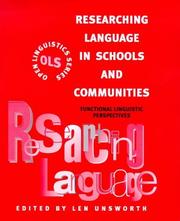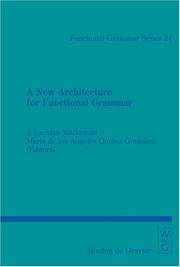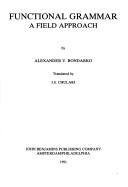| Listing 1 - 10 of 88 | << page >> |
Sort by
|
Book
ISBN: 9027215669 9789027215666 9789027292803 9027292809 1282154923 9781282154926 9786612154928 6612154926 Year: 2006 Volume: 57 Publisher: Amsterdam Benjamins
Abstract | Keywords | Export | Availability | Bookmark
 Loading...
Loading...Choose an application
- Reference Manager
- EndNote
- RefWorks (Direct export to RefWorks)
This article extends the boundaries of Columbia School linguistic semantic theory by applying its analytical constructs to nonlinguistic behaviors, where, as in language, there exist systematicity and arbitrariness: food; construction of social and gender identity; and use of architectural, private, and urban space. Further, meaningful elements of these behaviors vary analogously to Labovian sociolinguistic feature variation. The guiding orientation is that human behavior is structured not by an unmotivated, autonomous culture, but is communicative and social, interpreted by people as signals with meanings; and these meanings are discerned as interpreting power, prestige and identity. Data come primarily from fieldwork in Lamu (Kenya) and Thailand.
Linguistics --- Functionalism (linguistics). --- Functionele linguïstiek. --- Funktionalismus (linguistik). --- Functionalism (Linguistics) --- Functional analysis (Linguistics) --- Functional grammar --- Functional linguistics --- Functional-structural analysis (Linguistics) --- Grammar, Functional --- Grammatical functions --- Structural linguistics --- Philosophy --- Language.

ISBN: 3110154048 311015403X 3110154064 3110154056 9783110155396 9783110218374 3110218372 9783110154061 9786613398642 1283398648 3110218364 9783110154030 9783110154054 9783110154047 Year: 1997 Volume: 20 Publisher: Berlin De Gruyter
Abstract | Keywords | Export | Availability | Bookmark
 Loading...
Loading...Choose an application
- Reference Manager
- EndNote
- RefWorks (Direct export to RefWorks)
Introduction When one takes a functional approach to the study of natural languages, the ultimate questions one is interested in can be formulated as: How does the natural language user (NLU) work? How do speakers and addressees succeed ...
Functionalism (Linguistics). --- Functionalism (Linguistics) --- Grammar --- Functional analysis (Linguistics) --- Functional grammar --- Functional linguistics --- Functional-structural analysis (Linguistics) --- Grammar, Functional --- Grammatical functions --- Linguistics --- Structural linguistics --- English language --- Syntax. --- Germanic languages
Book
ISBN: 1283233975 9786613233974 9027282013 9789027282019 1556193815 9781556193811 Year: 1996 Publisher: Amsterdam Philadelphia, PA J. Benjamins
Abstract | Keywords | Export | Availability | Bookmark
 Loading...
Loading...Choose an application
- Reference Manager
- EndNote
- RefWorks (Direct export to RefWorks)
This collection of papers offers an alternative to mainstream functional linguistics on two points. Especially in American linguistics, function and structure are often viewed almost as polar opposites; in addition, structure is often understood as being only a matter of linguistic form - or expression - as opposed to content. The book tries to illustrate why function and structure must be understood as mutually dependent in relation to language - and why the most interesting aspect of language structure is the way it structures the content side of language. In this, the book represents a reaf
Danish language --- Functionalism (Linguistics) --- Functional analysis (Linguistics) --- Functional grammar --- Functional linguistics --- Functional-structural analysis (Linguistics) --- Grammar, Functional --- Grammatical functions --- Linguistics --- Structural linguistics --- Grammar. --- Grammar --- Danish language - Grammar.

ISBN: 1281294659 9786611294656 1847140912 9781847140913 9780304702442 0304702447 9780304702459 0304702455 0826478719 9780826478719 9780826478719 9781847140913 0304702447 0304702455 9781281294654 6611294651 Year: 2000 Publisher: London ; Washington : Cassell,
Abstract | Keywords | Export | Availability | Bookmark
 Loading...
Loading...Choose an application
- Reference Manager
- EndNote
- RefWorks (Direct export to RefWorks)
Researching Language in Schools and Communities is designed for those who intend to carry out and / or study research in children's language development, teaching English as a second language, children's literature, casual conversation, social class and language variation, classroom discourse, reading processes, teaching writing, literacy and curriculum area learning, critical literacies and related areas. The contributors are among the foremost researchers in these fields. In this book they introduce approaches to help investigate such areas in applied language research using systemic
Linguistics --- Functionalism (Linguistics) --- Functional analysis (Linguistics) --- Functional grammar --- Functional linguistics --- Functional-structural analysis (Linguistics) --- Grammar, Functional --- Grammatical functions --- Structural linguistics --- Research. --- Functionalism (Linguistics).
Book
ISBN: 8024627655 9788024627656 9788024627427 8024627426 Year: 2014 Publisher: Praha Karolinum
Abstract | Keywords | Export | Availability | Bookmark
 Loading...
Loading...Choose an application
- Reference Manager
- EndNote
- RefWorks (Direct export to RefWorks)
Book
ISBN: 9027250235 9786613174284 1283174286 9027283346 9789027250230 Year: 1990 Volume: 13 Publisher: Amsterdam Benjamins
Abstract | Keywords | Export | Availability | Bookmark
 Loading...
Loading...Choose an application
- Reference Manager
- EndNote
- RefWorks (Direct export to RefWorks)
Rather than simply a record of proceedings (3rd International Conference on Functional Grammar, Amsterdam, June 1988), this volume contains revised and expanded papers from the conference and other papers inspired by the lively discussion there. The volume focuses on the nature of the structures assumed to underlie utterances in natural languages, in two respects. One area is the question of whether to expand the representations accepted in Functional Grammar (FG) in order to capture interpersonal functions, i.e., communication between speaker and hearer in a particular situation and context,
Grammar --- Hierarchy (Linguistics) --- Functionalism (Linguistics) --- Functional analysis (Linguistics) --- Functional grammar --- Functional linguistics --- Functional-structural analysis (Linguistics) --- Grammar, Functional --- Grammatical functions --- Linguistics --- Structural linguistics --- Stratification (Linguistics) --- Hierarchies --- Linguistic analysis (Linguistics) --- Compositionality (Linguistics) --- Fonctionnalisme (linguistique) --- Hierarchie (linguistique)
Book
ISBN: 9027236240 9786613312624 128331262X 9027276307 9789027276308 9789027236241 1556195753 9789027236241 9781556195754 Year: 1996 Publisher: Amsterdam Benjamins
Abstract | Keywords | Export | Availability | Bookmark
 Loading...
Loading...Choose an application
- Reference Manager
- EndNote
- RefWorks (Direct export to RefWorks)
This volume focuses on the relation between theory and description by examining aspects of transitivity in different languages. Transitivity - or case grammar, to use the popular term - has always occupied a centre-stage position in linguistics, not least because of its supposedly privileged relation to states of affairs in the real world. Using a systemic functional perspective, the ten papers in this volume make a contribution to this scholarship by focusing on the transitivity patterns in language as the expression of the experiential metafunction. Through a study of different languages - E
Linguistics --- Grammar, Comparative and general. --- Functionalism (Linguistics) --- Metalanguage. --- Second-order language --- Linguistic analysis (Linguistics) --- Functional analysis (Linguistics) --- Functional grammar --- Functional linguistics --- Functional-structural analysis (Linguistics) --- Grammar, Functional --- Grammatical functions --- Structural linguistics --- Philology
Book
ISBN: 9027230471 9789027230478 9789027281883 9027281882 1283280310 9786613280312 Year: 1998 Volume: 44 Publisher: Amsterdam Benjamins
Abstract | Keywords | Export | Availability | Bookmark
 Loading...
Loading...Choose an application
- Reference Manager
- EndNote
- RefWorks (Direct export to RefWorks)
Functional Grammar (FG) as set out by Simon Dik is the ambitious combination of a functionalist approach to the study of language with a consistent formalization of the underlying structures which it recognizes as relevant. The present volume represents the attempts made within the FG framework to expand the theory so as to cover a wider empirical domain than is usual for highly formalized linguistic theories, namely that of written and spoken discourse, while retaining its methodological precision. The book covers an array of phenomena, both from monologue and from dialogue material, relati
Grammar --- Pragmatics --- Functionalism (Linguistics) --- Interpersonal communication. --- Discourse analysis. --- Discourse grammar --- Text grammar --- Semantics --- Semiotics --- Communication --- Interpersonal relations --- Functional analysis (Linguistics) --- Functional grammar --- Functional linguistics --- Functional-structural analysis (Linguistics) --- Grammar, Functional --- Grammatical functions --- Linguistics --- Structural linguistics

ISBN: 3110173565 9786612193699 1282193694 3110197111 9783110197112 9783110173567 Year: 2004 Volume: 24 Publisher: Berlin Mouton de Gruyter
Abstract | Keywords | Export | Availability | Bookmark
 Loading...
Loading...Choose an application
- Reference Manager
- EndNote
- RefWorks (Direct export to RefWorks)
The present volume offers a new architecture for Functional Grammar, bringing together many discoveries of recent years. In a core article by Kees Hengeveld, a background is given to a dozen contributions by an international array of scholars, each of whom further develops the model in his or her own area of expertise. The volume concludes with an epilogue by Hengeveld, in which he draws together the various strands into a united concept. The volume will be a central point of reference for work in Functional Grammar.
Grammar --- Pragmatics --- 801.56 --- 801.56 Syntaxis. Semantiek --- Syntaxis. Semantiek --- Functionalism (Linguistics) --- Discourse analysis. --- Discourse grammar --- Text grammar --- Functional analysis (Linguistics) --- Functional grammar --- Functional linguistics --- Functional-structural analysis (Linguistics) --- Grammar, Functional --- Grammatical functions --- Semantics --- Semiotics --- Linguistics --- Structural linguistics

ISBN: 9027215421 1556192606 9786613328151 1283328151 9027277796 9789027215420 Year: 1991 Volume: 35 Publisher: Amsterdam Benjamins
Abstract | Keywords | Export | Availability | Bookmark
 Loading...
Loading...Choose an application
- Reference Manager
- EndNote
- RefWorks (Direct export to RefWorks)
Every grammar has to a greater or lesser extent a functional aspect. In this book, Bondarko provides a comprehensive discourse on the theoretical foundations of grammar, concentrating on functional-semantic fields, with emphasis on the diversity of their structural types. Criteria for distinguishing between linguistically structured meaning and non-linguistic cognitive content is developed in a discussion on "the Category of Aspect and its Environment" which includes an analysis of aspectual opposition according to the Prague School. Special attention is also paid to analysing polycentric fiel
Functionalism (Linguistics) --- Russian language --- Grammar --- Fonctionalisme (Linguistique) --- Functionalisme (Taalwetenschap) --- Russian language - Grammar. --- Slavic languages, Eastern --- Functional analysis (Linguistics) --- Functional grammar --- Functional linguistics --- Functional-structural analysis (Linguistics) --- Grammar, Functional --- Grammatical functions --- Linguistics --- Structural linguistics --- Grammar. --- Russian language - Grammar
| Listing 1 - 10 of 88 | << page >> |
Sort by
|

 Search
Search Feedback
Feedback About UniCat
About UniCat  Help
Help News
News